Introduction
The Standards of LIFE is a policy framework for sustainable human society. In addition to the obvious meaning of the word “life”, LIFE is also an acronym for Legitimate Infrastructure for a Free Environment.
Understanding that there are many aspects of policy that cannot be determined in advance of the events that precipitate their necessity, we have built our framework from the ground up by visiting first a set of universal Principles on which everything we advocate stands.
Next, keeping the Principles in mind, we developed a set of Standards around which Policies can be formulated. This is a very deliberate and important arrangement for LIFE, and this Study Guide leads you through the structure from Principles to Policies so that you have a clear idea of the basis for our Policies, and you will be able to develop new policies for yourself and your community using the Principles and Standards as navigation tools.
The Standards of LIFE consciously builds on what is already in place and assumes that we are starting from the ground we are already standing on, taking with us all the lessons learned and the benefits gained from the development of the rule of law, technology, capital finance and social infrastructure. Our goal is to improve what we have, not start again from zero.
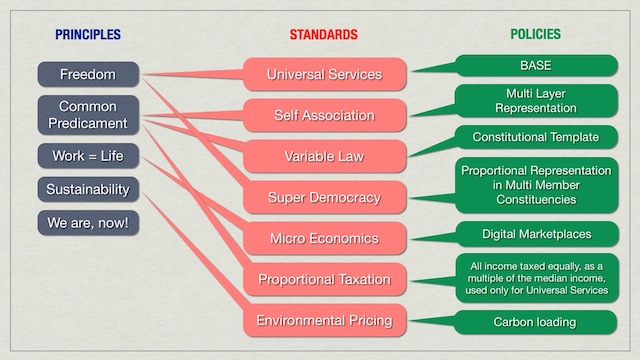
The Principles
There are five core Principles at the heart of LIFE. These are the guiding lights around which all else revolves. We believe that if we agree with these Principles, then the Standards flow naturally and logically from these Principles.
- Personal and Political – Start with the Structure.
- Our personal freedom is a fact of life; our only choices are to respect it, or not.
- Political freedom is the expression of our personal freedom in the public space, through the exercise of choice in the community we belong to and our representation in communal decision making.
- We are all in this – You, Me, Everybody, we are all members of our society.
- As a species we decided many centuries ago to live together in community, and the success of that strategy means that now there are more than 6 billion humans on Earth. We are now all mutually interdependent and mutually responsible, and that means that we must acknowledge our common predicament and common destiny.
- Work is life.
- Experience shows that every human is fundamentally dependent for their happiness on their ability to contribute to their community using their natural skills and interests. In a functional society there is no distinction between working, contributing and living.
- Balance with Nature is not optional, we must reach sustainability
- We have evolved so far that we are now partners in our evolution, along side the natural world we inhabit, mutually dependent on each other for the sustenance of all life.
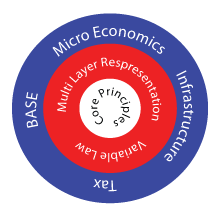
- We have evolved so far that we are now partners in our evolution, along side the natural world we inhabit, mutually dependent on each other for the sustenance of all life.
- We are the creators of our reality – We can change what we doing, and we can start changing it now.
The Standards
In examining how the Principles can be fashioned into practice, we see that we need a set of Standards that can form the building blocks for the more detailed Policies relevant to, and adjusted for, different societies. These Standards are the first stage in the practical embodiment of the Principles, without specifying the exact details necessary for implementation on the ground, which can be decided by the citizens of the society relevant to their place and time.
While the Principles can be seen as isolated truths, the Standards form a cohesive structure of elements that are dependent on each other for their effectiveness. Together the Standards are a manifestation of the Principles, creating the platform on which we can build our future societies.
- Universal Services.
- Recognizing our mutual interdependence and honoring our humanity, we promise each other the bare necessities of life and the opportunity to make the most of our skills and talents. This promise is delivered by providing every member of our society with the basic services of shelter, sustenance, healthcare and transport, as well as education, access to information and the protection of legal services. A BASE which can be relied upon but which does not provide anything more than the services themselves.
- Multi-layered self association.
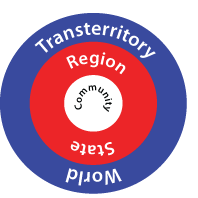
- The expression of our freedom to choose our community and express our identity is made manifest by allowing every citizen to choose their association with their neighbors. This is practically enabled through the division of government into geographical layers starting with the Community, through Regions and States to Transterritories and finally the World. Every person is a citizen of, and votes for, 5 layers of government.
- Variable Law and a common constitution.
- A common constitution for every layer provides a common framework for the rule of law, with the power and determination of jurisdiction rising up from the lowest layer, the Community. Higher layers, such as Regions and States, only have authority in aspects of law promoted to them from their constituents members below. Variable law provides the constitutional legal framework that makes multi-layer self association real, from the bottom up!
- Proportional representation and effective decision making.
- Effective political freedom is realized by using the most advanced democratic system yet devised: Proportional representation in multi member constituencies. Everybody’s vote counts in every election
- Effective decision making is realized by accrediting elected representatives with the full count of the voting support they receive, when they vote in their assembly. Party politics is subordinated to personal representation.
- Micro-economics unleashes the true potential of humankind as a complement to enterprise.
- The Principle of work=life is made real by the support provided by Universal Services and gives birth to the true economic potential of humanity by enabling the marginal contribution of every person in every society to create a resilient, sustainable and prosperous economic fabric. No one has to work to physically survive and so even the smallest contribution is worth while.
- Organized enterprises fill an important role in the provision of services, resource development and the coordination of collective effort.
- Taxation structures to harness the power of collective and individual responsibility.
- The LIFE tax system is based on principles of contribution and responsibility that link the revenues collected by society directly to the needs of the society and the prosperity of its population. Using the median income of the population as a key metric, and counting all income irrespective of source as the same, the tax system devotes income taxes to the provision of Universal Services and leaves all other public expenditures to be funded from sales or business taxes.
- Environmental stewardship.
- Acting on behalf of our common environment we agree to add the costs of using environmental resources into our economic pricing systems.

The Policies
The policies that any society develops from the Standards and Principles laid out above will vary according the circumstances, culture and desires of the people in those societies.
In this wiki there are many examples of detailed policies developed as a guide to show how the practical implementation of the Standards of LIFE can be achieved.
These links will take you to more detailed pages on the many different aspects of policy:
- Universal Safety
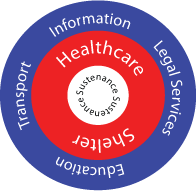 (BASE)
(BASE)
- Shelter
- Sustenance
- Healthcare
- Transport
- Education
- Information
- Legal Services
- Multi-layered self association.
- Community

- Region
- State
- Transterritory
- World
- Community
- Variable Law and a common constitution.
- Variable Law
- Constitution
- Proportional representation and effective decision making.
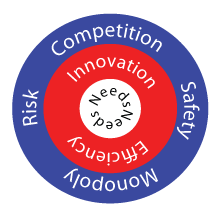 Micro-economics to unleash the true potential of humankind.
Micro-economics to unleash the true potential of humankind.
- SPEx|Digital marketplaces
- Enterprise to harness the power of collective action.
- Environmental stewardship.
- Carbon loading
- Waste and energy efficiency
- xID|Digital Identity

